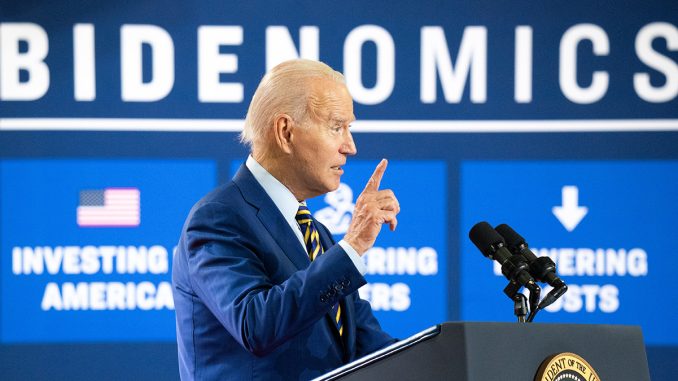
More than 180,000 Americans sent in comments on the Biden administration’s stringent emissions rule, which threatens to remove cheaper and more reliable gas cars from the market in favor of less popular electric vehicles.
A total of 15,995 Americans submitted comments opposing the new rules through a portal created by Heritage Action for America, the grassroots arm of The Heritage Foundation, representing 8.7% of all comments. (The Daily Signal is The Heritage Foundation’s news outlet.)
“Submitting nearly 16,000 comments during this regulation’s comment period alone, Heritage Action’s network of grassroots Americans has spoken out against the EPA’s new plan to squeeze gas-powered vehicles out of the market with strict carbon emission standards,” Ryan Walker, acting executive director at Heritage Action, told The Daily Signal.
“These public comments will be critical in helping delay, change, or even defeat the Biden administration’s latest executive overreach,” Walker added. “Heritage Action and grassroots Americans have shown they will continue to fight back against the Biden administration’s radical agenda.”
The new Environmental Protection Agency rules, which a Heritage Foundation scholar dubbed “Government Grand Theft Auto,” mandate fewer emissions of carbon dioxide, nitrogen oxide, and other greenhouse gases for model years beginning in 2027 and stretching to 2032. By that year, carmakers will have to cut emissions from cars, pickup trucks, vans, and SUVs by 56%.
The EPA has acknowledged that the new rules are so stringent that carmakers will have to make up to 67% of new vehicles electric in order to comply.
“These proposed rules effectively require an additional tenfold sales increase [in EVs] in a mere eight years,” the Alliance for Automotive Innovation, which represents General Motors, Toyota Motor Corp., Volkswagen, Hyundai, and others, told Reuters. “EPA is also proposing the most stringent criteria pollutant regulations ever, premised on largely the same levels of zero emission vehicles.”
As Diana Furchtgott-Roth, director of Heritage’s Center for Energy, Climate and Environment, recently wrote, Americans prefer gasoline-powered cars because they are more affordable.
The electric version of the Ford F-150 pickup truck, the bestselling vehicle in America, costs an additional $26,000 over the gasoline-powered one. Tesla’s electric vehicles start at $39,000 for a Model 3 and go up to nearly $100,000 for a Model X—quite a bit beyond most Americans’ price range.
Although gas-powered cars take five or 10 minutes to refill, recharging an electric vehicle can take 45 minutes—and that does not factor in the wait if someone else gets there first.
It also remains unclear what this pain will achieve. Kevin Dayaratna, chief statistician and a senior research fellow at Heritage, calculated that completely eliminating all fossil fuels from the United States would result in a reduction of less than 0.2 degrees Celsius in temperature by 2100.
The Biden administration can issue these stringent rules, but the law requires the administration to listen to Americans when they submit comments about any major new rules.
Federal agencies open their proposed rules and regulations to “notice and comment,” a process by which everyday citizens may weigh in. Agencies must read the comments, and sometimes courts will cite them even if the government decides to go forward with a rule.
Last month, the Department of Education announced that it would delay implementation of a new Title IX rule (forcing schools to allow male athletes to compete in women’s sports) by five months—from late May to October—because it received more than 240,000 public comments.
It remains unclear whether the EPA will delay or reconsider its emissions rules following this notice-and-comment period.
Have an opinion about this article? To sound off, please email letters@DailySignal.com and we’ll consider publishing your edited remarks in our regular “We Hear You” feature. Remember to include the URL or headline of the article plus your name and town and/or state.

